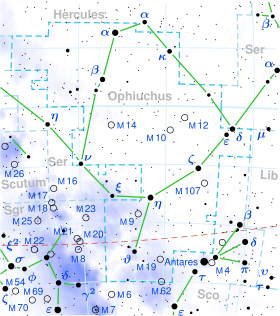오피우치 시
Xi Ophiuchi| 관측 데이터 에폭 J2000 이쿼녹스 J2000 | |
|---|---|
| 별자리 | 오푸치우스 |
| 우측 상승 | 17h 21m 00.37520s[1] |
| 탈위임 | −21° 06′ 46.5663″[1] |
| 겉보기 크기 (V) | 4.39[2] |
| 특성. | |
| 스펙트럼형 | F2V[3] |
| U-B색지수 | -0.06[4] |
| B-V색지수 | +0.41[4] |
| 아스트로메트리 | |
| 방사 속도 (Rv) | -8.93±0.30km[5]/s |
| 고유 운동 (μ) | RA: +263.84[1]mas/yr Dec.: -1968.85mas[1]/yr |
| 시차 (π) | 57.62 ± 0.26[1] 마스 |
| 거리 | 56.6 ± 0.3 ly (17.36 ± 0.08 pc) |
| 절대치수 (MV) | 3.19[2] |
| 세부사항[6] | |
| A | |
| 미사 | 1.30 M☉ |
| 반지름 | 1.59±0.06 R☉ |
| 루미도 | 4.429±0.035[5] L☉ |
| 표면 중력 (log g) | 4.15±0.10 cgs |
| 온도 | 6,611±80 K |
| 금속성 [Fe/H] | −0.27±0.07 덱스를 만들다 |
| 회전 속도 (v sin i) | 20.2±0.7km/s |
| 나이 | 916[7] 마이어 |
| 기타 지정 | |
| 데이터베이스 참조 | |
| 심바드 | 자료 |
ξ 오프는 시 오피우치로 라틴어화된 것으로 적도 별자리의 시각적 이항성[9] 체계다.[2]황백색의 빛깔을 띠며, 육안에는 4.39의 겉보기 크기를 조합하여 희미하게 보인다.[2]이 시스템은 시차(parallax)를 기준으로 태양으로부터 약 56.6광년 떨어진 곳에 위치하지만 방사상 속도 -9km/s로 더 가깝게 표류하고 있다.[1][5]
진도 4.40[10] 1차, 지정 성분 A는 F2V의 별 분류를 가진 일반 F형 주계열성이다.[3]9억 1천[7] 6백만 년 전의 것으로, 20 km/s의 예상 회전 속도로 회전하고 있다.이 별은 태양의 1.3배, 태양의 반지름의 1.6배의 질량을 가지고 있다.[6]그것은 유효 온도 6,611 K로 광권으로부터 태양의 4[5].4배의 광도를 방출하고 있다.[6]
이 시스템은 X선 방출의 원천이다.[11]궤도를 선회하는 동반자 성분 B는 2015년 현재 1차에서 27°의 위치 각도를 따라 35°의 각이 분리되어 있는 진도 8.9 항성이다.규모 10.8의 시각적 동반자, 구성 요소 C는 2004년 현재 10.8˚의 분리에 있다.[10]
참조
- ^ a b c d e f Van Leeuwen, F. (2007). "Validation of the new Hipparcos reduction". Astronomy and Astrophysics. 474 (2): 653–664. arXiv:0708.1752. Bibcode:2007A&A...474..653V. doi:10.1051/0004-6361:20078357. S2CID 18759600. Vizier 카탈로그 항목
- ^ a b c d Anderson, E.; Francis, Ch. (2012). "XHIP: An extended hipparcos compilation". Astronomy Letters. 38 (5): 331. arXiv:1108.4971. Bibcode:2012AstL...38..331A. doi:10.1134/S1063773712050015. S2CID 119257644. Vizier 카탈로그 항목
- ^ a b Gray, R. O.; Corbally, C. J.; Garrison, R. F.; McFadden, M. T.; Bubar, E. J.; McGahee, C. E.; O'Donoghue, A. A.; Knox, E. R. (2006). "Contributions to the Nearby Stars (NStars) Project: Spectroscopy of Stars Earlier than M0 within 40 pc--The Southern Sample". The Astronomical Journal. 132 (1): 161–170. arXiv:astro-ph/0603770. Bibcode:2006AJ....132..161G. doi:10.1086/504637. S2CID 119476992.
- ^ a b Mallama, A. (2014). "Sloan Magnitudes for the Brightest Stars". The Journal of the American Association of Variable Star Observers. 42 (2): 443. Bibcode:2014JAVSO..42..443M.Vizier 카탈로그 항목
- ^ a b c d Brown, A. G. A.; et al. (Gaia collaboration) (August 2018). "Gaia Data Release 2: Summary of the contents and survey properties". Astronomy & Astrophysics. 616. A1. arXiv:1804.09365. Bibcode:2018A&A...616A...1G. doi:10.1051/0004-6361/201833051. 이 소스에 대한 가이아 DR2 기록 VizieR.
- ^ a b c Fuhrmann, K.; Chini, R.; Kaderhandt, L.; Chen, Z. (2017). "Multiplicity among Solar-type Stars". The Astrophysical Journal. 836 (1): 139. Bibcode:2017ApJ...836..139F. doi:10.3847/1538-4357/836/1/139.
- ^ a b David, Trevor J.; Hillenbrand, Lynne A. (2015). "The Ages of Early-Type Stars: Strömgren Photometric Methods Calibrated, Validated, Tested, and Applied to Hosts and Prospective Hosts of Directly Imaged Exoplanets". The Astrophysical Journal. 804 (2): 146. arXiv:1501.03154. Bibcode:2015ApJ...804..146D. doi:10.1088/0004-637X/804/2/146. S2CID 33401607. Vizier 카탈로그 항목
- ^ "ksi Oph". SIMBAD. Centre de données astronomiques de Strasbourg. Retrieved 2019-10-08.
- ^ Eggleton, P. P.; Tokovinin, A. A. (September 2008). "A catalogue of multiplicity among bright stellar systems". Monthly Notices of the Royal Astronomical Society. 389 (2): 869–879. arXiv:0806.2878. Bibcode:2008MNRAS.389..869E. doi:10.1111/j.1365-2966.2008.13596.x. S2CID 14878976.
- ^ a b Mason, Brian D.; et al. (200). "The 2001 US Naval Observatory Double Star CD-ROM. I. The Washington Double Star Catalog". The Astronomical Journal. 122 (6): 3466. Bibcode:2001AJ....122.3466M. doi:10.1086/323920. Vizier 카탈로그 항목
- ^ Haakonsen, Christian Bernt; Rutledge, Robert E. (September 2009). "XID II: Statistical Cross-Association of ROSAT Bright Source Catalog X-ray Sources with 2MASS Point Source Catalog Near-Infrared Sources". The Astrophysical Journal Supplement. 184 (1): 138–151. arXiv:0910.3229. Bibcode:2009ApJS..184..138H. doi:10.1088/0067-0049/184/1/138. S2CID 119267456.



